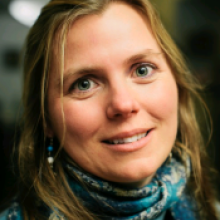
Assistant Professor, Fisheries & Wildlife
Oregon State University (OSU)
Phone: (541) 737-2207 | Email: kelly.biedenweg@oregonstate.edu
Early Career Award – Environmental Protection Agency
Education
School of Forest Resources and Conservation, University of Florida, Gainesville, FL (2010)
Ph.D., Human Dimensions of Natural Resource Management
Conservation Biology, Antioch University New England, Keene, NH (2005)
M.S., Conservation Biology
Marine Ecology, Western Washington University, Bellingham, WA (1998)
B.S., Marine Ecology
Research Interests
- Conservation Psychology and Human Wellbeing
- Applied research on human dimensions of natural resource management
- Program Evaluation and Facilitation
- Environmental Education and Social Learning
Selected Publications
- Biedenweg, K. and N. Gross-Camp (2018) A brave new world: Integrating well-being and conservation. Ecology and Society 23(2):32.
- Biedenweg, K., H. Harguth and K. Stiles (2017) The science and politics of human wellbeing: A case study of co-creating indicators for Puget Sound restoration. Ecology and Society 22: 11.
- Williams, K., K. Biedenweg and L. Cerveny (2017) Managing for Ecosystem Service Preferences across Residential Classifications near Mt. Baker Snoqualmie National Forest. Forests 8: 157.
- Biedenweg, K., T. Scott and R. Scott. (2017) How does engaging with nature relate to life satisfaction? Demonstrating the link between environment-specific social experiences and life satisfaction. Journal of Environmental Psychology 50: 112-124.
- Spalding, A. and K. Biedenweg (2017) Socializing the coast: Engaging the social science of tropical coastal research. Estuarine, Coastal and Shelf Science 187(5):1-8.
- Spalding, A., K. Biedenweg, M. Nelson and A. Hettinger (2017) Demystifying the Human Dimension of Ecological Research. Frontiers in Ecology and the Environment 15(3):119.
- Biedenweg, K., K. Stiles and K. Wellman (2016) A holistic framework for identifying human wellbeing indicators for marine policy. Marine Policy 64:31-37.
- Besser, D., R. McLain, L. Cerveny, K. Biedenweg and D. Banis (2014) Mapping Landscape Values: Issues, Challenges and Lessons Learned from Field Work on the Olympic Peninsula, Washington. Environmental Practice 16: 138-150. doi: https://doi.org/10.1017/S1466046614000052
- Biedenweg, K., L. Cerveny and R. McLain (2014) Values Mapping with Latino Forest Users: Contributing to the dialogue on multiple land use conflict management. Practicing Anthropology 36: 33-37.
- Biedenweg, K. and M.C. Monroe (2013) Teasing Apart the Details: What characteristics of capacity building projects influence community forest management in the Bolivian Amazon? Human Ecology 41(2): 239-253.
- McLain, R., M. Poe, K. Biedenweg, L. Cerveny, D. Besser, and D. Blahna (2013) Making Sense of Human Ecology Mapping: An Overview of Approaches to Integrating Socio-Spatial Data into Environmental Planning. Human Ecology 41(5): 651-665. DOI 10.1007/s10745-013-9573-0
- Biedenweg, K. and M.C. Monroe (2013) Cognitive Methods and a Case Study for Assessing Shared Perspectives as a Result of Social Learning. Society and Natural Resources 26(8):931-944.
- Biedenweg, K. and M.C. Monroe (2013) Teasing apart the details: How social learning can affect collective action in the Bolivian Amazon. Human Ecology 41: 239–253.
- McLain, R., M. Poe, K. Biedenweg, L. Cerveny, D. Besser and D. Blahna (2013) Making sense of Human Ecology Mapping: An overview of approaches to integrating socio-spatial data into environmental planning. Human Ecology 41: 651–665.
- Biedenweg, K. and M.C. Monroe (2013) Cognitive methods and a case study for assessing shared perspectives as a result of social learning. Society and Natural Resources 26: 931-944.
- Biedenweg, K. (2012) A Framework for Evaluating Forest Conservation Implications of Community-based Capacity Building: Experiences from the Northern Bolivian Amazon. Conservation and Society.
- Barsimontov, J., A. Racelis, K. Biedenweg and M. Digiano (2010) When Collective Action and Tenure Allocation Collide: Outcomes from community forests in Quintana Roo, Mexico and Petén, Guatemala. Land Use Policy 28(1): 343-352.
- Duchelle, A., K. Biedenweg, C. Lucas, J. Radachowsky, D. Wojcik, M. Londres, D. Alvira, W.L. Bartels, A. Virapongse, K. Kainer (2009) Graduate Students and Knowledge Exchange with Local Stakeholders: Possibilities and Preparation. Biotropica Special Issue 41:5, 578-587.
- Cabrera, L., K. Biedenweg, I. Camacho, D. Rojas Céspedes, A. Shenkin, D. Elliott, and S. Perz (2009) Las comunidades campesinas y la pavimentación de carreteras en Pando, Bolivia. Bolivian Studies Journal/RevistaE 8:1.
- Cerveny, L.C., K. Biedenweg, K. and R. McLain (early online) Mapping meaningful places on Washington’s Olympic Peninsula: Toward a deeper understanding of landscape values. Environmental Management.
Biosketch
Dr. Kelly Biedenweg is an assistant professor in the Department of Fisheries and Wildlife at Oregon State University. has a Ph.D. in the human dimensions of natural resource management. She currently works primarily in the Puget Sound and Oregon looking at the link between ecosystem services and human values and wellbeing. Prior, she spent about ten years in Latin America researching community forest management in the Bolivian Amazon and environmental leadership development in Honduras. She has a B.S. in marine ecology and an M.S. in conservation biology.
In her spare time, Dr. Biedenweg likes to make functional pottery and admires those with the patience for sculpting.She has received a prestigious Environmental Protection Agency early career award to study how to plan for ecosystem restoration while simultaneously considering human well-being.


